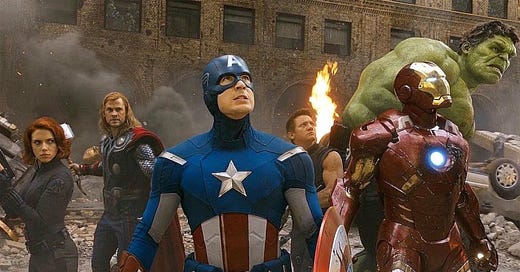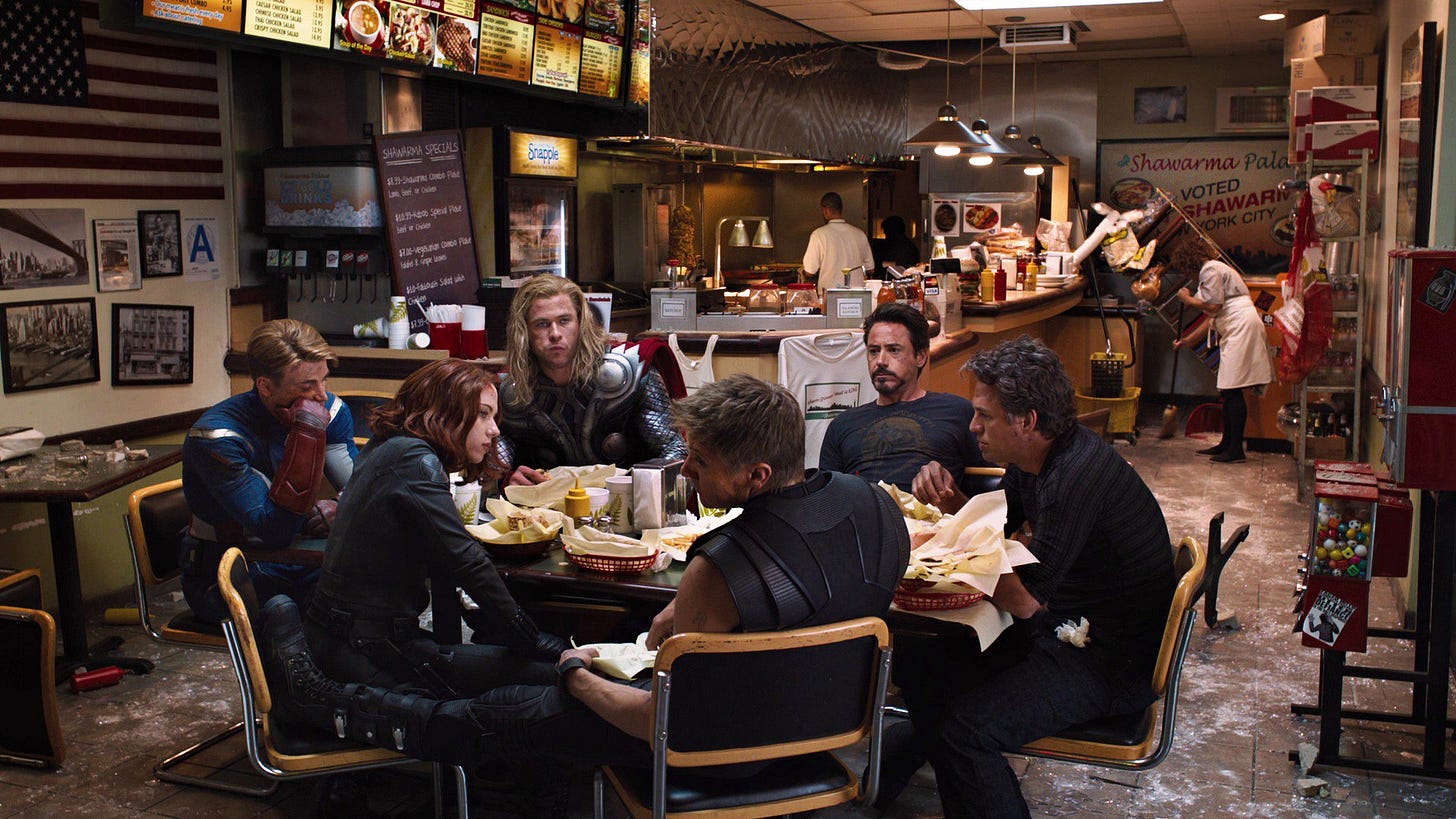It’s hard to believe it’s been ten years.
I’d taken the day off to attend an all-day marathon of the five films that then constituted to the Marvel Cinematic Universe ahead of the main event: a midnight screening of The Avengers on May 4, 2012. It had been a long day for those of us assembled at the theater, but the excitement was palpable as the clock ticked toward midnight. To pass nearly of a nice early summer day indoors with fellow fans watching Iron Man, Captain America, Black Widow, and company on the big screen and then see The Avengers was something of an exceptional experience, one that’s fairly easy to put into words yet hard to fully capture in substance.
Other moviegoers soon started to show up at the multiplex for their own midnight screenings, some of them decked out in superhero costumes for the occasion. I’m ever so slightly embarrassed by this style of enthusiasm for, well, anything, both in this particular case and in general. There’s no doubt that I share something of the same passion put on display by these cosplayers – after all, I spent an entire day and a decent chunk of change for the privilege of occupying a dark theater to see these movies one after another. I won’t be able to put my finger on it until years later, when I read the writer Oliver Burkeman describes this sheepish feeling as a trustworthy sign that an activity or interest is “a source of true fulfillment,” one that’s enjoyed for its own sake rather than social approval.
Today, however, it’d be impossible to replicate the electric atmosphere of that early May night a decade ago. Though it was successful enough in its own right at the time, the Marvel Cinematic Universe wasn’t yet the juggernaut we know today – a perhaps too-well-known quantity with an enormous base of devoted fans spanning the entire spectrum of American life. Indeed, it’s become easy to forget just what a risky and uncertain bet Iron Man and star Robert Downey, Jr. in particular were in 2008, and many people have. Characters that average, normal people couldn’t have picked out of a lineup if they tried back when Iron Man debuted are now household names, and it'd now take the better part of two days to watch the more than twenty films that now make up the MCU uninterrupted.
What’s more, midnight screenings of highly anticipated blockbusters like The Avengers have long since faded into oblivion. The frission and excitement of being amongst the first to see a movie, or even the sort of dedication and interest required to make a midnight showing of a particular film, no longer exists – not when theaters desperate to fill seats make it easy to see them in on late Thursday afternoons, as I’ll be doing with Doctor Strange in the Multiverse of Madness. That’s not to downplay the social aspect of certain movies – indeed, the best way to watch Marvel films like Avengers: Endgame or Spider-Man: No Way Home is in a packed, cheering theater – but it’s still clear that the feeling of exhilaration that coursed through the air that night in 2012 has gone forever and will prove impossible to resurrect.
It was around 2:30 in the morning when The Avengers finally finished, but we’re all energized and invigorated by what we’ve just seen. I drove away from the multiplex in a car I’d rented for the day from a carsharing service, but I felt so amped up and alive that I found it hard to get to sleep when I got home – or even sleep at all. I’m exhausted the next day at work but still fired up by the previous day’s marathon, akin to the sort of high a person achieves after a tiring but vigorous workout.
That night showed us all something magical up on the silver screen, a vivid and inimitable cinematic experience that came together by serendipity and good fortune – if not plain sheer luck. A whole new universe had opened up right before our eyes, pulling us in and leaving us rubbing our eyes in wonder at the new possibilities we glimpsed. That’s hard to imagine now given the colossus the Marvel Cinematic Universe since became and the fashionable flak it now takes, but our shared and individual responses to that first showing of The Avengers spoke to the power of cinema as a medium and the awe it can inspire in audiences.
Above all else, though, The Avengers gave us flawed but deeply human characters who strive to do the right thing and live up to their own potential. We want to spend time with this unlikely, fractious band of heroes and watch them struggle to overcome their fears, mistakes, and self-doubts. We’re with these characters every step of the way as they proceed on their difficult and costly moral journeys, seeking to become better people in spite of it all.
The spirit and appeal of The Avengers - and the Avengers themselves - can be witnessed in two very different scenes: the team’s initial assembly at the climax of the film and a short, silent post-credits shot of the exhausted Avengers enjoying shawarma at a local storefront diner. The first scene sees the camera circle around the Avengers as they come together for the first time as a unit and fight off an alien invasion of New York City, all with composer Alan Silvestri’s rousing orchestral theme thundering in the background. It’s a scene that works only because audiences have seen these characters butt heads with each other and wrestle with themselves over the previous hour and fifty minutes. Without these conflicts – Thor, Captain America, and Iron Man duking it out in their first encounter, the entire team bickering amongst themselves as the villainous Loki sets his scheme in motion – and the emotional ties they forge, this stirring shot would have had nowhere near the same dramatic effect on audiences it did.
But it’s the post-credits shawarma scene that truly captures the heart and soul of The Avengers and, indeed, the Marvel Cinematic Universe as a whole. Clearly worn out by their battle with Loki and his army, our six heroes sit around a table the shawarma joint Tony Stark spotted during the course of the fighting. It’s a brief moment based on what at first glance seems like a throwaway line Stark utters at the very end of the battle, but it’s one that producer Kevin Feige and director Joss Whedon ran with and eventually shot on the very night of the film’s world premiere in Los Angeles. The unlikely camaraderie on display gets directly to the heart of the matter: audiences enjoy seeing these characters and seeing them together, even if they’re just munching on shawarma at the end of a long and grueling day.
There’s also a distinct and elemental faith in humanity beating at the heart of The Avengers, one that’s all the more noteworthy given the often-checkered pasts and transparent shortcomings of its protagonists. Indeed, the faith the movie places in its characters reflects and embodies its weathered, world-weary faith in humanity. Both as individuals and a team, the Avengers themselves stand as avatars of humanity as well as its defenders and, ultimately, vindicators. It’s a notion that’s encapsulated by the arcs of individual characters like Tony Stark and Natasha Romanoff across the MCU’s larger narrative; they’re as messy, imperfect, and full of self-doubt as humanity itself can be. But they do their best to transcend these shortcomings and become better people, genuinely and sincerely seeking to rise to the occasion and do the right thing in spite of the physical pains and emotional losses they inevitably encounter along the way.
It's an underlying streak of humanism that’s also neatly revealed by a pair of sequences that bookend the film. The first occurs at the very beginning of the movie, where a voiceover brings audiences up to speed on the premise of The Avengers: Loki has been deputized by an as-yet unnamed and unseen antagonist – later shown to be the arch-villain Thanos – to retrieve an artifact known as the Tesseract from “little world” called Earth. “And the humans?” this chief henchman known as the Other sneers, “What can they do but burn?” After the Avengers prevail against Loki and his army, however, in a mid-credits scene the Other is forced to concede, “Humans… They are not the cowering wretches we were promised. They stand. They are unruly, and therefore cannot be ruled. To challenge them is to court… death.”
Does humanity in fact deserve to be saved? That’s an open and rather large question, but one The Avengers resolutely answers in the affirmative. Over the course of the film, the Avengers themselves show that humanity is at the very least worth fighting for and believing in, no matter our failings and imperfections. This is the sort of faith in humanity The Avengers offers us: bruised and bloodied, perhaps, but heartfelt and ultimately unbowed – even in the face of impossible odds.
None of this should be surprising given how these stories and characters flow from the same emotional and thematic streams as myths and legends have drawn from for millennia. But to see The Avengers up on the big screen for the first time that night ten years ago was to partake in a unique experience, to inhabit a fleeting moment in time when a universe of endless possibilities opened up right before our eyes. That sense of infinite potential was inevitably lost with the onward march of time and the progress of the MCU’s overarching narrative. It’s a loss that naturally stings, no matter how well we think the subsequent entries in this sprawling cinematic enterprise are done or how much we may enjoy them. This onward march foreclosed possibilities as it took certain paths and not others - as in life, so in cinema.
In the end, The Avengers left us with a set of six remarkable, flawed, larger-than-life, indelible, and above all human characters. It’s a profoundly humanistic experience to spend more than a decade with this particular group of fictional characters, one the likes of which will not come again any time soon. This sort of alchemy is virtually impossible to create on purpose; it emerges organically rather than by design. The chemistry and camaraderie between the original six cast members (matching tattoos involved, naturally), for instance, isn’t something that could have been planned out or calculated ahead of time. Looking back ten years later, it’s clear The Avengers and the wider, character-driven cinematic odyssey it anchors represent a very real storytelling achievement – one that reminds us in equal measure that there’s no substitute for serendipity and that humanity is worth believing in, all its faults and foibles included.
That’s the true status of The Avengers in contemporary popular culture – and it’s more than earned it.





So glad you had a link to this piece from a few years ago. Just wish I had read this sooner!